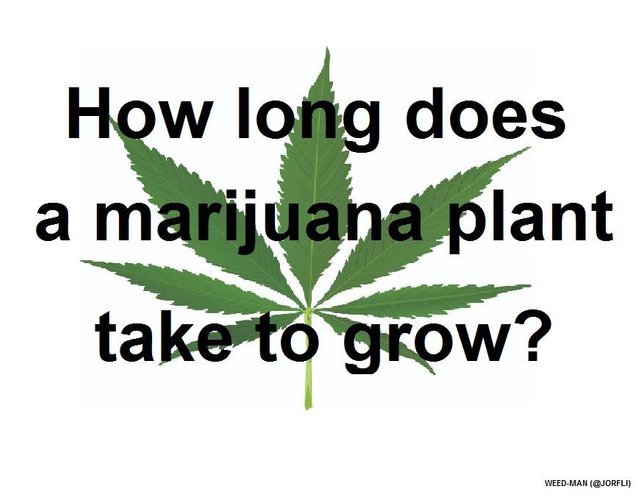
How long does it take to grow a marijuana plant? Impatience is not recommended in almost any aspect of life, but in the topic that concerns us (the cultivation / cannabis self-cultivation) it should be noted that it is even less desirable. The correct development in time and the shape of our plant, will be what makes the difference between a productive plant or a "bunch of branches" with hardly any foliage or production.
Today we talk about the time of normal development and the phases of the cannabis plant.
We will start by differentiating the different phases of its development:
Germination
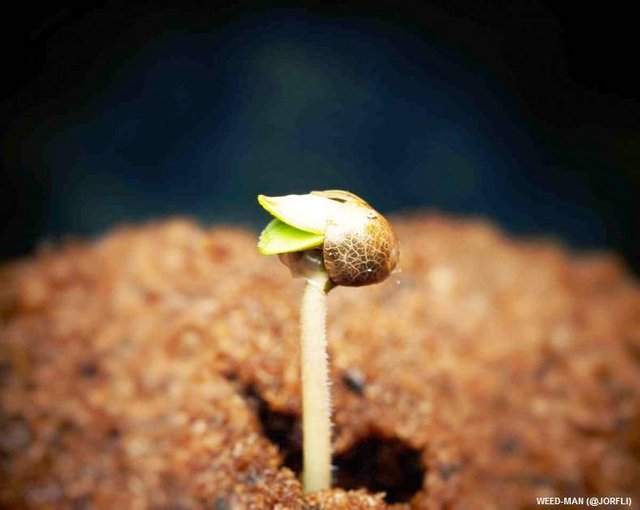

We will define as the germination phase that period in which the seed develops until it becomes a seedling.
In cases where we use cuttings, this time of germination will be identified with the time of cloning and rooting it.
The techniques for germination are of different kinds. The most used and recommended is the one that uses a napkin or wet paper as the basis for the seed; However, there are many who do it with other less recommendable methods: on wet cotton, directly on the ground or jiffy disk or in water.
Some growers also use stimulators for germination that favor the initial metabolism of the seed and soften its bark, making the germination time practically reduced to one day in most cases.
For the other assumptions, this time is relative. It will depend, not only on the type of variety, but on the quality of the seed itself. Some determining factors will be the age of the seed, the fertility or not of it, or the way in which it has been conserved.
The time it takes to sprout the seedling is usually around 24-72 hours, although it is not rarely that they can last up to 5 or even 10-15 days. Of course, take into account the conditions of water and humidity, oxygenation and, above all, that the temperature during this phase oscillates between 21-24ºC.
the growth phase
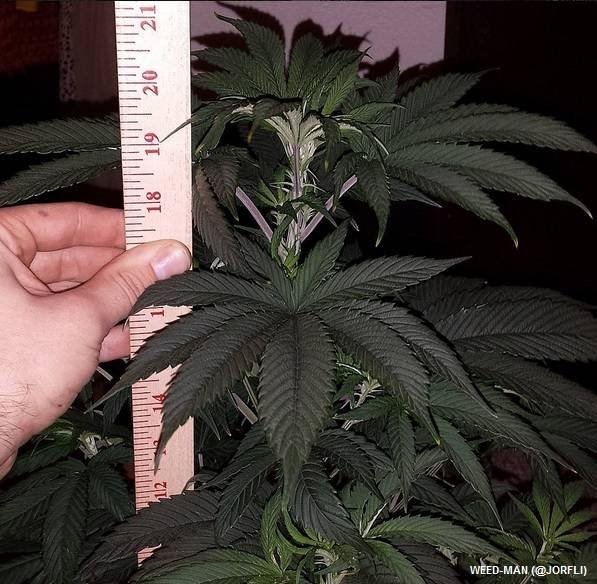

It is also called "vegetative phase". It is the central phase in the development of our plant and surely, the most important.
After obtaining our seedling and continuing with its transplant (either immediately or directly to the pot), the growth phase will begin. As its name indicates, in it, our friend will obtain its majority compression and will acquire the morphology and size necessary to obtain in its development the next stage, flowering.
As we all know, the photoperiod in this phase will be greater than in the previous and successive ones. In general, eighteen hours of light are recommended for six hours of darkness per day. A correct balance between light and darkness will be key to its perfect development. Not only light will be important (by photosynthesis) but also those hours of absolute darkness will be fundamental, since it is when the exchange of gases essential for the metabolism of plant cells occurs.
This period will last more or less, depending on the type of seed, the variety and / or the type of crop. In this way, autoflowering will be faster than feminized and, at the same time, indoor crops will generally be faster than those outside. In the same way, using a light source of greater power, it will look for a more accelerated growth than with light bulbs of less power.
It is difficult to standardize the time that the growth phase lasts, like any other period, due to the amount of environmental, plant and external factors (fertilizer and grower's experience) that can mark the crop. Usually, indoors, we will talk about 3 or 4 weeks (21 to 25 days) for autoflowering and 6 or 8 weeks for feminized.
Although regular and feminized tend to tend to a season for the outdoor season that is around 8-9 months of growth, in an indoor crop we can distort climatic and environmental conditions by trying to force growth more than normal and can reduce its ordinary cycle.
That being the case, when we see that within these temporary parameters, the plant has an appropriate size and begins to discover its first inflorescences, it will be time to change the photoperiod to begin the flowering cycle.
Flowering
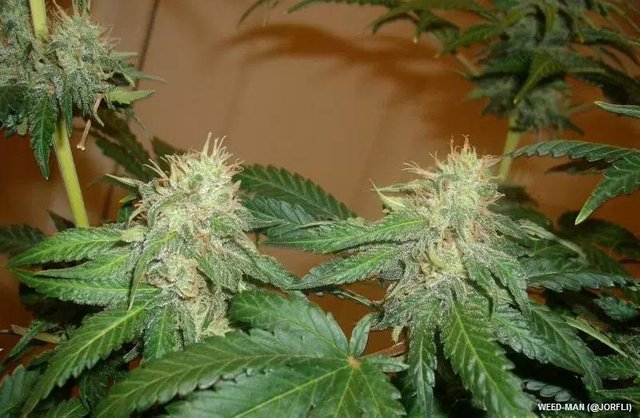

Last of the cannabis development periods. Its start will depend, no longer exclusively on the growth time that we give to the plant, but also that it has the right characteristics to sustain those precious buds that will be developed.
Thus, there will be occasions when, for example, one month after germination has elapsed, if we see that our plant is weak or small and without any sign of inflorescences; we will have to endure more the growth phase.
That said, and under that temporary estimate, the autoflowering varieties will mark their flowering in a practically autonomous way, and we should limit ourselves to changing their photoperiod when they require it. Seasonal seeds, on the other hand, will depend on the inside of the grower's hand. It will be necessary to change the photoperiod to twelve hours of light and dark per day, to induce the flowering phase to the plant by light stress.
If relative was the time that the plant takes in its growth, it is even more so in its flowering phase. Here there are no more rules than the different seed banks feel about their different varieties, however, in most cases they will be merely indicative.
The important thing when deciding when the flowering ends and therefore, proceeds to the cleaning of roots and cutting of the plant, is fundamentally that we observe the total development of the buds. While the time that marks the bank in question will give us an idea of when it will be that moment, the essential thing is that we observe that the buds are fattening to cover or be buried in it most of the pistils.
Once developed, the harvest time will be marked by the maturation and progressive oxidation of the pistils and trichomes, acquiring that characteristic amber / honey color.
So indoors, autoflowering will generally complete its final development in about eight weeks and feminized varieties, may be extended more depending on the growth that we have procured, being the most normal around 10-12 weeks onwards.
Drying-curing
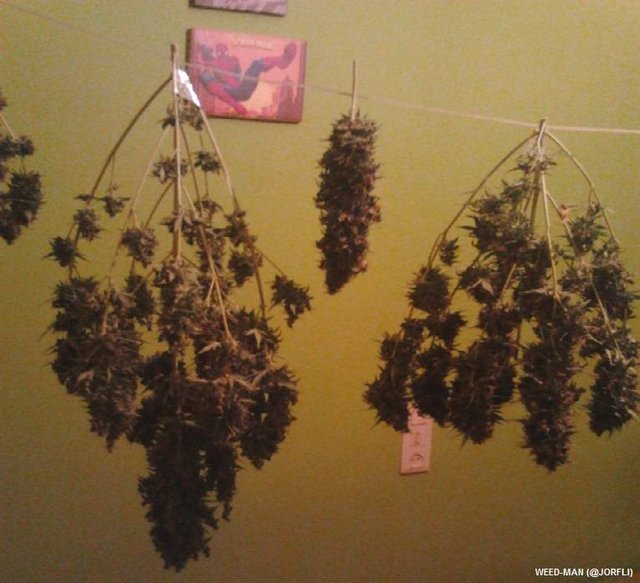

We can not frame it strictly as one of the stages of cannabis development. But of course, it is a process that will take us a while and that will be as determinant as the previous ones to achieve a quality production in flavor, smell, effect and power.
It is necessary to differentiate between drying and curing. Drying is the first of the treatments to which we must submit our harvest.
Consist, basically, in placing in a dark, cool and dry place all the cut and manicured buds on a drying network (remember to clean the roots at the end of the crop with abundant irrigation). The maintenance of the product will happen by rotating day by day the buds of the mesh or network, in order to avoid its deformity and settlement on the same side.
This process can last, according to the location or orography, of two to four weeks. However, the identitary sign of a properly dried head is that of being able to bend its stem, being able to hear its click but without breaking, only bending.
After this drying process, the cure ... like the good ham.
It consists, simply, in removing and storing all the buds in a container and letting it rest with periodic aeration. Healing can be done in different containers, whether plastic, glass or wood; the latter being faster and the glass, the most recommended (does not emit toxic or odors).
The container in which we store the harvest should be kept in the same way in a dark, cool and dry place. The only thing that we will have to do is to open the container daily for about five minutes so that the little moisture that the stem releases, is lost progressively.
This process usually lasts between 2 and 6 weeks. The key point of healing will be that in which the bud cracks when pressed lightly; when bending its stem, it starts and does not bend and, above all, it loses its intense green color and does not emit the smell of grass (this is a sign that it still conserves part of its chlorophyll).
Conclusion
According to these estimations we see how marijuana takes a long time to develop completely around three months in autoflowering and four or five months in advance for feminized, depending on the type of crop and care. Besides, we must take into consideration the drying and curing, which will last about one to two months more approximately.
Depending on the care we give to the plant, as well as the variety we choose, the times of each phase will be greater or lesser and, consequently, the time of its complete development.
Of course we insist that for the cultivator, patience is fundamental in obtaining good results.
